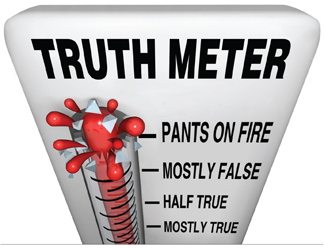 A number of newspapers are using a "truth meter" approach to the proclamations of national and local politicians, rating what has been stated as truth, mostly true, half true, mostly false, or so false it is rated "pants on fire." There are a good many statements made about and by the insurance industry which ought to undergo such metering as well. In some cases, it is advertisements in the mainstream or industry media that should be tested; in most it is political statements that warrant a veracity check.
A number of newspapers are using a "truth meter" approach to the proclamations of national and local politicians, rating what has been stated as truth, mostly true, half true, mostly false, or so false it is rated "pants on fire." There are a good many statements made about and by the insurance industry which ought to undergo such metering as well. In some cases, it is advertisements in the mainstream or industry media that should be tested; in most it is political statements that warrant a veracity check.
My old Irish father often said, "If you believe everything you hear, you will eat everything you see." While his comments were primarily directed toward some delicacies such as snails, tripe, and edible weeds, the bodacious eaters on the Travel Channel would have one believing that one can thrive on everything from roaches and rats to monkey tail stew. What the poor people in famine-struck areas of the world eat would nauseate most of us, but it may be all they have. However, if they consumed the typical American diet of hot dogs, bacon burgers, and cola, then it would probably kill them just as it is killing us. The government is constantly updating what we need for a good nourishing meal, and it surely is not that. Its recommendations rate a "mostly true."
However, why do we need the government to tell us what to eat or not eat? Are we like the tour guide my wife and I had on a Scandinavian tour who said, "Vee are vaiting for our government to tell us vut to tink?" I could not imagine an American saying, "We are waiting for Washington to tell us what to think." That would be like waiting for a jury to tell the court what is truth. One does not find truth in court cases; one finds only what facts may influence a decision when the case is adversarial. If it was not adversarial, then it would not be in court. On the contrary, we need to tell Washington what to think or do. Because of a lack of action recently, we may need to do more than tell them. We need to remind the government that most of the time its pants are on fire, and it needs to start seeking the truth.
Recommended For You
Want to continue reading?
Become a Free PropertyCasualty360 Digital Reader
Your access to unlimited PropertyCasualty360 content isn’t changing.
Once you are an ALM digital member, you’ll receive:
- Breaking insurance news and analysis, on-site and via our newsletters and custom alerts
- Weekly Insurance Speak podcast featuring exclusive interviews with industry leaders
- Educational webcasts, white papers, and ebooks from industry thought leaders
- Critical converage of the employee benefits and financial advisory markets on our other ALM sites, BenefitsPRO and ThinkAdvisor
Already have an account? Sign In Now
© 2025 ALM Global, LLC, All Rights Reserved. Request academic re-use from www.copyright.com. All other uses, submit a request to [email protected]. For more information visit Asset & Logo Licensing.








